Originally posted on November 17, 2023 @ 6:57 am
Are you out of fresh ginger but still craving that warm, spicy flavor in your cooking? Or perhaps you prefer the convenience of using ginger powder? Whatever your reason may be, substituting ginger powder for fresh ginger is a great option.
In this comprehensive guide, we’ll explore everything you need to know about using ginger powder as a substitute for fresh ginger in your cooking. From understanding the flavor profile to best practices for using it in your dishes, we’ve got you covered. So, let’s get started!
Table of Contents
Key Takeaways:
- Substituting ginger powder for fresh ginger can be a convenient option.
- Ginger powder is made by drying and grinding fresh ginger and offers a similar flavor profile.
- When substituting ginger powder for fresh ginger, remember that it is more concentrated and adjust accordingly.
- Properly stored, ginger powder can last for up to two years, making it a reliable pantry staple.
- Experimenting with different ginger substitutes can add an exciting twist to your dishes.
What is Ginger Powder?
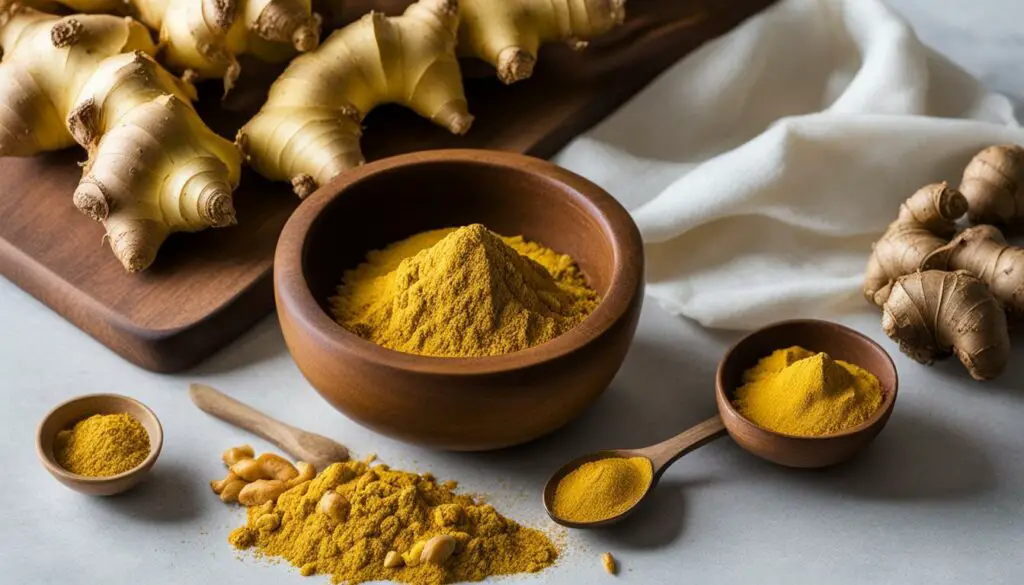
Ginger powder, also known as powdered ginger, is a spice that is made from drying and grinding fresh ginger. It is a popular ingredient in various cuisines around the world and is used to add flavor and warmth to dishes.
Ginger powder is a concentrated form of fresh ginger and has a more intense flavor profile than its fresh counterpart.
| Feature | Powdered Ginger | Fresh Ginger |
|---|---|---|
| Preparation | Made by drying and grinding fresh ginger root | Harvested and peeled from the ginger plant |
| Flavor | More concentrated, slightly sweeter and more pungent | Milder, more fibrous, with a zesty and slightly tangy flavor |
| Consistency | Fine powder | Chunky, fibrous flesh |
| Shelf Life | Up to 2 years | A few weeks |
While powdered ginger and fresh ginger share many similarities, they do have some notable differences. The flavor and consistency of ginger powder make it a convenient and versatile substitute for fresh ginger in many recipes.
Why Substitute Ginger Powder for Fresh Ginger?
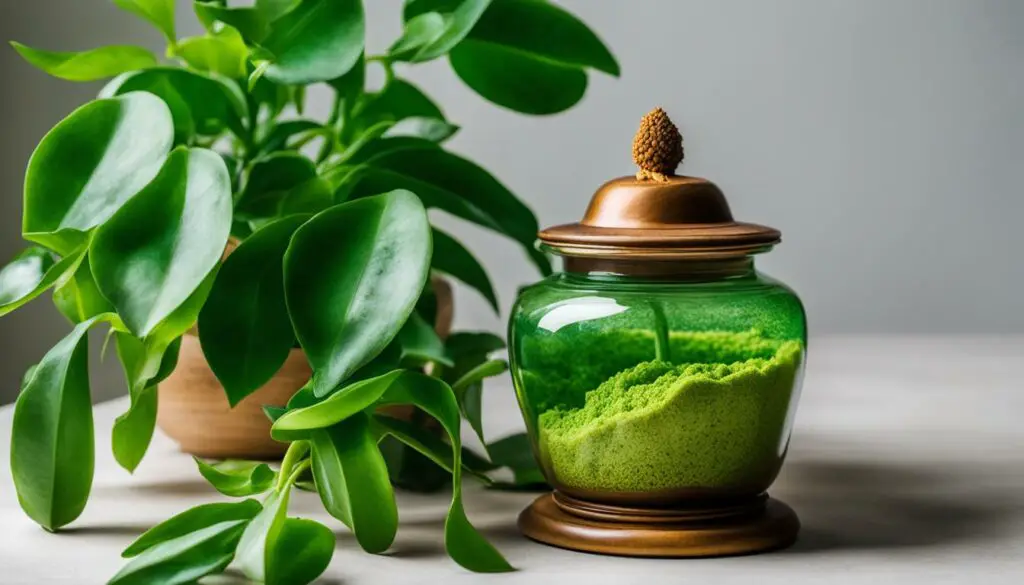
When it comes to adding a touch of warmth and flavor to dishes, ginger is an essential ingredient in many cuisines. While fresh ginger is a popular choice, there are several reasons why you might opt for its powdered counterpart:
- Ginger powder has a longer shelf life than fresh ginger, making it a convenient pantry staple for impromptu cooking sessions.
- Using ginger powder provides a more consistent flavor profile than fresh ginger, which can vary in intensity.
- Ginger powder is much easier to measure than fresh ginger, making it a more precise ingredient in recipes.
By substituting ginger powder for fresh ginger, you can enhance the flavor of your dishes while also enjoying the convenience that comes with using a dried spice.
Understanding the Flavor of Ginger Powder
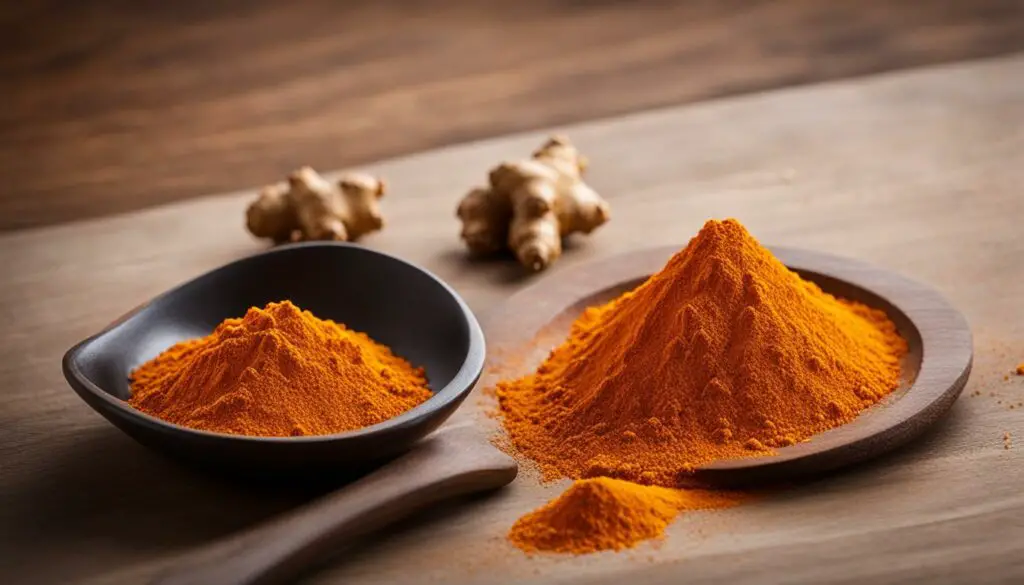
Using ginger powder instead of fresh ginger is a convenient option, but it’s important to note that the flavor may vary slightly. Ginger powder retains the pungent and spicy flavor of fresh ginger, but it’s more concentrated. This means that you’ll need to use less ginger powder than fresh ginger to achieve the same level of flavor.
If a recipe calls for fresh ginger, you can substitute it with ginger powder. However, if you’re cooking with ginger powder for the first time, it’s best to start with a small amount and adjust as needed. Adding too much ginger powder can overpower the other flavors in the dish.
Experimenting with different amounts of ginger powder will help you achieve the desired flavor balance in your dishes. Whether you’re using ginger powder in a marinade, soup, stir-fry, or baked goods, start with a small amount and taste as you go.
“Ginger powder offers a similar flavor to fresh ginger, but it’s more concentrated. Start with a small amount and adjust as needed.”
Comparing Fresh Ginger and Ginger Powder
When comparing the flavor of fresh ginger and ginger powder, it’s important to note that fresh ginger provides a fibrous texture, while ginger powder dissolves more easily in liquids. If you’re using ginger powder in a recipe that calls for fresh ginger, you may need to adjust the cooking method accordingly to ensure the desired results.
Here’s a quick summary of the differences between fresh ginger and ginger powder:
| Fresh Ginger | Ginger Powder | |
|---|---|---|
| Flavor | Pungent, spicy | Pungent, spicy (more concentrated) |
| Texture | Fibrous | Dissolves more easily in liquids |
| Measurement | 1 tablespoon grated fresh ginger = 1 teaspoon ginger powder | 1 teaspoon ginger powder = 1 tablespoon grated fresh ginger |
By understanding the flavor profile of ginger powder and experimenting with different amounts, you can confidently substitute it for fresh ginger in your favorite recipes. Now, let’s explore how to convert fresh ginger to ginger powder in Section 5.
Converting Fresh Ginger to Ginger Powder
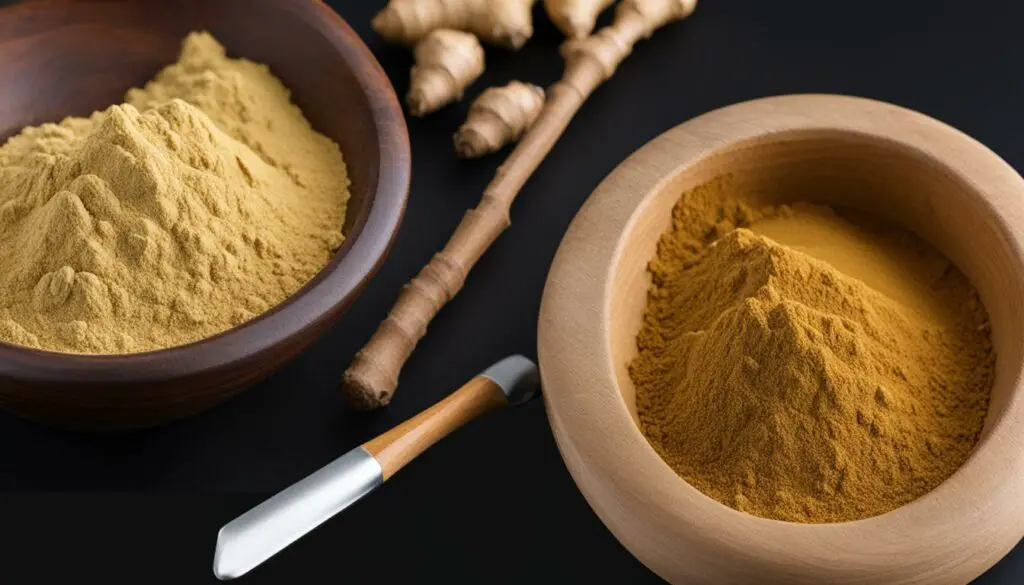
If you find yourself without fresh ginger but have ginger powder at hand, don’t worry! The good news is that it’s quite easy to convert fresh ginger to ginger powder.
As a general rule, one tablespoon of fresh grated ginger is equivalent to one teaspoon of ginger powder. Of course, this is just a starting point, so feel free to adjust the amount based on your personal taste preferences and the specific recipe.
Here’s a quick table to help you convert the measurements when substituting fresh ginger with ginger powder:
| Fresh Ginger | Ginger Powder |
|---|---|
| 1 teaspoon | 1/3 teaspoon |
| 1 tablespoon | 1 teaspoon |
| 1/4 cup | 1 tablespoon |
Remember, ginger powder is more concentrated than fresh ginger, so it’s always a good idea to start with less and add more if necessary.
Using ginger powder instead of fresh ginger can be incredibly convenient, and with these simple conversion methods, you can keep your dishes flavorful and delicious.
Enhancing Flavors with Ginger Powder
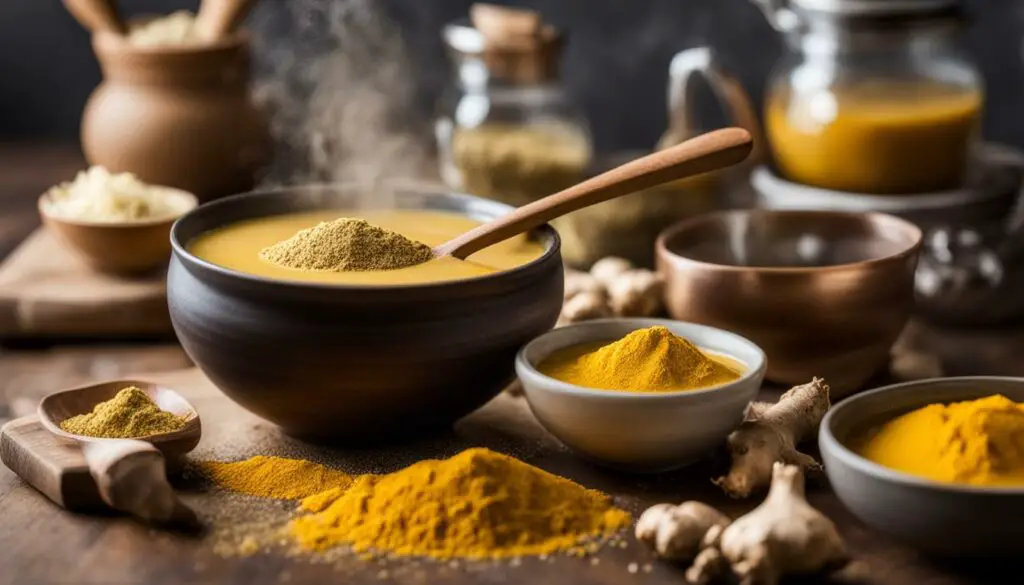
Using ginger powder instead of fresh ginger can be a fantastic way to add depth and complexity to your dishes. The warm and slightly tangy taste of ginger powder pairs well with both sweet and savory ingredients, making it a versatile spice for any recipe.
If you’re not sure how to incorporate ginger powder into your cooking, try starting with simple dishes like soups or marinades. For example, you can add a teaspoon of ginger powder to your favorite chicken noodle soup for an enhanced flavor and aroma.
Ginger powder can also be used in baking, adding a warm and spicy flavor to your favorite cookies and cakes. Try adding a pinch of ginger powder to your next batch of pumpkin muffins or gingerbread cookies for an extra kick of flavor.
Sample Recipe: Ginger Powder Marinade
Here’s a sample recipe for a ginger powder marinade that you can use for meats, tofu, or vegetables:
| Ingredients | Amount |
|---|---|
| Soy sauce | 1/4 cup |
| Honey | 1/4 cup |
| Ginger powder | 1 tsp |
| Garlic powder | 1 tsp |
| Black pepper | 1/2 tsp |
To prepare the marinade, simply mix all the ingredients in a bowl and pour over your desired protein or vegetables. Let it marinate for at least an hour, or overnight for more flavor. Grill, bake, or sauté your marinated dish for a delicious and aromatic meal!
Remember to use less ginger powder than fresh ginger when cooking, as ginger powder is more potent. Start with small amounts and adjust according to your taste preferences. As with any spice, it’s always a good idea to taste as you go and make adjustments as necessary.
Best Practices for Using Ginger Powder as a Substitute for Fresh Ginger
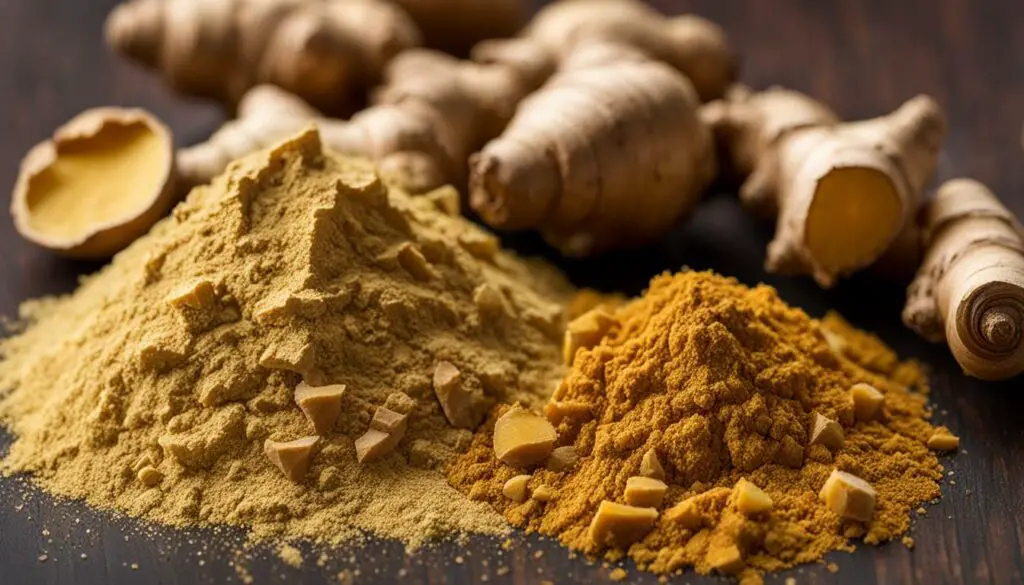
Using ginger powder instead of fresh ginger can be a fantastic way to add flavor and convenience to your cooking. However, there are a few best practices to keep in mind to ensure the best results:
- Remember that ginger powder is more concentrated than fresh ginger. Start with less and add more if necessary to avoid overpowering the dish.
- Ginger powder dissolves more easily in liquids, while fresh ginger provides a fibrous texture. Adjust the cooking method to ensure the desired results.
- Consider the balance of other ingredients and flavors in the recipe. Taste as you go and make adjustments to achieve the desired taste and aroma.
By following these best practices, you can confidently substitute ginger powder for fresh ginger and elevate the flavor of your dishes!
Balancing Other Flavors in Recipes
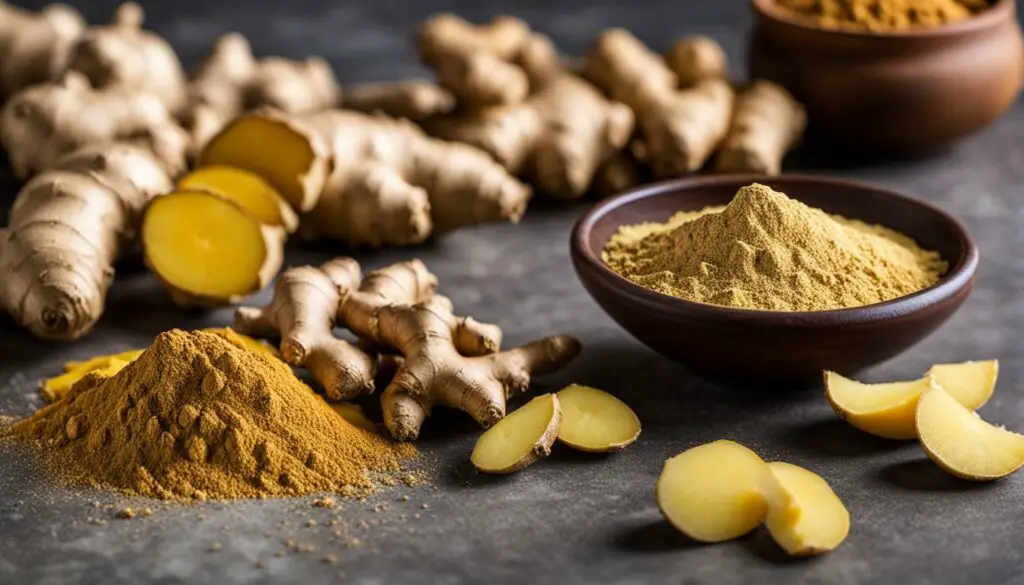
When substituting ginger powder for fresh ginger in recipes, it’s essential to consider other ingredients’ balance and their flavors to ensure a harmonious result. Ginger powder’s pungent and spicy flavor can be overwhelming when used in large quantities and may require additional balancing ingredients or recipe alterations.
Here are some tips to balance flavors when using ginger powder as a substitute for fresh ginger:
- Start with a small amount of ginger powder and add more gradually, tasting as you go.
- Consider other complementary spices and herbs like garlic, cinnamon, or coriander.
- Use contrasting flavors like sour or sweet to balance the spiciness of ginger powder. For example, adding a bit of sugar or vinegar can help to balance the heat and add complexity.
It’s essential to note that while ginger powder can be a suitable substitute, it may not always provide the same depth of flavor as fresh ginger. Therefore, it’s advisable to experiment with different ginger substitutes to find the best match for your recipe.
Example of Balancing Flavors in a Recipe
Here’s an example of a recipe that calls for fresh ginger:
Stir-fried chicken with broccoli and ginger
Serves: 4
Ingredients:
- 1 tablespoon vegetable oil
- 1 lb boneless skinless chicken breasts, sliced
- 2 cups broccoli florets
- 1 tablespoon fresh ginger, grated
- 1 tablespoon soy sauce
- 1/4 teaspoon red pepper flakes (optional)
Instructions:
- Heat the vegetable oil in a large skillet over medium-high heat.
- Add the chicken and stir-fry for 4-5 minutes until cooked through.
- Add the broccoli and fresh ginger and continue to stir-fry for 2-3 minutes until the broccoli is tender-crisp.
- Remove from heat and stir in the soy sauce and red pepper flakes (if using).
- Serve over rice.
If substituting ginger powder for fresh ginger in this recipe, start with 1/2 teaspoon of ginger powder instead of 1 tablespoon of fresh ginger. You can also add a touch of honey or sugar to balance the spiciness and add a touch of sweetness.
Storage and Shelf Life of Ginger Powder
If you’re substituting ginger powder for fresh ginger, it’s important to understand how to store it properly to maintain its quality and flavor. Ginger powder has a significantly longer shelf life than fresh ginger, making it a reliable pantry staple.
To keep ginger powder fresh, store it in an airtight container in a cool, dark place. Exposure to light, heat, and moisture can cause it to lose flavor and potency. If stored properly, ginger powder can retain its quality for up to two years.
In comparison, fresh ginger has a shorter shelf life of about two weeks in the refrigerator and up to six months in the freezer. This makes ginger powder a convenient and cost-effective substitute, especially if you don’t use fresh ginger frequently.
The Advantages of Ginger Powder
In addition to its longer shelf life, substituting ginger powder for fresh ginger has many other advantages. Ginger powder is more convenient to use and provides a consistent flavor profile. This can be especially helpful when making large batches of recipes or if you prefer a milder ginger flavor.
Furthermore, ginger powder dissolves easily in liquids, making it an excellent choice for marinades, dressings, and sauces. The powdered form allows for precise measurement and can be used in a variety of dishes, from baked goods to savory entrees.
Incorporating Ginger Powder into Your Recipes
Now that you know how to substitute ginger powder for fresh ginger, it’s time to get creative in the kitchen. Ginger powder can be used in a variety of dishes and cuisines, adding a touch of warmth and depth of flavor. Here are some ideas to get you started:
- Add ginger powder to your morning smoothie for a zesty kick.
- Use ginger powder in marinades for meats to tenderize and add flavor.
- Add ginger powder to your stir-fries or sautéed vegetables for a touch of heat.
- Use ginger powder in baking to add a warm, spicy flavor to cookies, cakes, and bread.
- Add ginger powder to your tea or hot beverage for a soothing and comforting drink.
As you become more comfortable using ginger powder, feel free to experiment with other recipes and see where this flavorful spice takes you!
Tip: If you’re hesitant to use ginger powder in place of fresh ginger, start by using smaller amounts and adjust to taste. Over time, you’ll become more confident and familiar with the flavor profile of ginger powder.
Incorporating Ginger Powder into Your Recipes
Now that you know how to substitute ginger powder for fresh ginger, it’s time to get creative in the kitchen. There are many ways to incorporate this versatile spice into your recipes, and here are some ideas to get you started:
- Add a pinch of ginger powder to your morning smoothie for an extra boost of flavor and nutrition.
- Sprinkle ginger powder on roasted vegetables for a warm and savory taste.
- Use ginger powder in marinades for meat and poultry to add a depth of flavor.
- Combine ginger powder with soy sauce, honey, and garlic for a quick and easy stir-fry sauce.
- Bake gingerbread cookies or cakes using ginger powder for a classic winter treat.
Remember, when using ginger powder instead of fresh ginger, start with less and add more if necessary, as ginger powder is more potent. You may also need to adjust the cooking method to ensure the same texture and consistency in your dish.
Here is a recipe to try that features ginger powder:
| Recipe: Ginger Sesame Salad Dressing | |
|---|---|
| This zesty dressing is perfect for salads, rice bowls, and more. | |
|
|
|
|
With the creative use of ginger powder, you can add warmth and depth to any dish. Whether you’re following a recipe or improvising, don’t hesitate to experiment and discover the unique flavor of ginger powder as a ginger substitute.
Conclusion
In conclusion, substituting ginger powder for fresh ginger can be a game-changer in your cooking routine. Not only is ginger powder more convenient and readily available, but it also provides a consistent flavor profile and has a longer shelf life.
It’s essential to understand the flavor profile and intensity of ginger powder when using it as a substitute for fresh ginger. Don’t forget to adjust the measurements and cooking method to ensure the desired results.
Explore the Possibilities of Ginger Powder
From marinades, soups, and stir-fries to baked goods and beverages, ginger powder can add depth and complexity to your culinary creations. It’s a versatile spice that can enhance the flavor and aroma of sweet and savory dishes alike.
If you’re looking for other substitutes for fresh ginger, consider ground ginger, ginger paste, or crystallized ginger. Experiment with different options to find the perfect fit for your recipe.
Enjoy the Warmth and Aroma of Ginger Powder
By following the tips and guidelines in this guide, you can confidently substitute ginger powder for fresh ginger in your recipes. Whether you’re an experienced home cook or a beginner, incorporating ginger powder into your dishes can elevate your culinary game.
So next time you run out of fresh ginger or prefer the convenience of ginger powder, grab your trusty spice jar and enjoy the warmth and aromatic essence of ginger powder in your cooking.
SEO Keywords: substitute ginger powder for fresh ginger, ginger powder vs fresh ginger
FAQ
What is ginger powder?
Ginger powder, also known as powdered ginger, is made by drying and grinding fresh ginger. It retains the pungent and spicy flavor of fresh ginger but in a concentrated form.
Why would I substitute ginger powder for fresh ginger?
There are several reasons why you might choose to substitute ginger powder for fresh ginger. Firstly, ginger powder has a longer shelf life and is more readily available than fresh ginger, making it a convenient option. Additionally, ginger powder provides a more consistent flavor profile and allows for easier measurement in recipes.
How should I use ginger powder instead of fresh ginger?
When substituting ginger powder for fresh ginger, it’s important to start with less and add more if necessary, as ginger powder can be slightly more potent. Ginger powder also dissolves more easily in liquids, so adjust the cooking method accordingly to ensure the desired results.
How do I convert fresh ginger to ginger powder?
If a recipe calls for fresh ginger but you only have ginger powder available, you can easily convert the measurements. As a general rule, one teaspoon of ginger powder is equivalent to approximately one tablespoon of fresh grated ginger. Adjust the amount based on your personal taste preferences and the specific recipe.
What is the shelf life of ginger powder?
Ginger powder has a considerably longer shelf life than fresh ginger. To maintain its flavor and potency, store ginger powder in a cool, dark place in an airtight container. Properly stored, it can retain its quality for up to two years.
Can I use other substitutes for fresh ginger?
Yes, there are other options to consider as substitutes for fresh ginger. Ground ginger, ginger paste, or even crystallized ginger can bring their unique flavors and textures to your dishes. Experimenting with different substitutes can add an exciting twist to your culinary creations.
How can I incorporate ginger powder into my recipes?
Now that you know how to substitute ginger powder for fresh ginger, it’s time to get creative in the kitchen. Explore recipes that specifically call for ginger powder or adapt existing ones by incorporating this versatile spice. From gingerbread cookies to curries, the options are endless when it comes to exploring the culinary possibilities of ginger powder.
See also:
Leave a Reply